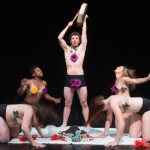Neo-Paganism is a nature religion which, like other nature religions, perceives nature as both sacred and interconnected. From this perspective, humans in the developed world have become tragically disconnected from nature, which has been desacralized in both thought and deed. Healing this rift is possible only through a profound shift in our collective consciousness. This constellation of ideas can be called “Deep Ecology”. This is the second in a 5-part series about some of “fruits” of Deep Ecology. This essay was originally published at Neo-Paganism.com.

The world is too much with us; late and soon,
Getting and spending, we lay waste our powers:
Little we see in Nature that is ours;
We have given our hearts away, a sordid boon!
The Sea that bares her bosom to the moon;
The winds that will be howling at all hours,
And are up-gathered now like sleeping flowers;
For this, for everything, we are out of tune;
It moves us not.–Great God! I’d rather be
A Pagan suckled in a creed outworn;
So might I, standing on this pleasant lea,
Have glimpses that would make me less forlorn;
Have sight of Proteus rising from the sea;
Or hear old Triton blow his wreathed horn.— William Wordsworth
“The re-enchantment of the world” is a phrase which is used frequently by Neo-Pagan authors. The corresponding phrase “disenchantment of the world” was coined by Max Weber. Weber was influenced Friedrich Schiller, who wrote about die Entgotterung der Natur, the “de-godding of nature.” The re-enchantment of the world refers to the return of a sense of mystery to the world or to a sense of our participation in that mystery through our non-intellective, imaginative faculties. Re-enchantment is a countercultural response to a reductionist and positivistic science which views nature (including human beings) as mechanism and a capitalism which reduces nature (including human beings) to commodity and resource.
In The Reenchantment of the World (1984), Morris Berman explains the origin of the disenchantment of the world:
“The view of nature which predominated in the West down to the eve of the Scientific Revolution was that of an enchanted world. Rocks, trees, rivers, and clouds were all seen as wondrous, alive, and human beings felt at home in this environment. The cosmos, in short was a place of belonging. A member of the cosmos was not an alienated observer of it but a direct participant in its drama. His personal destiny was bound up with its destiny, and this relationship gave meaning to his life. This type of consciousness — which I shall refer to in this book as ‘participating consciousness’ — involves merger, or identification with one’s surroundings, and bespeaks a psychic wholeness that has long since passed from the scene.
“The story of the modern epoch, at least on the level of mind, is one of progressive disenchantment. … The scientific mode of thinking can best be described as disenchantment, nonparticipation, for it insists on a rigid distinction between observer and observed. Scientific consciousness is alienated consciousness; there is no ecstatic merger with nature. … The logical endpoint of this worldview is a feeling of total reification: everything is an object, alien, not-me; and I am ultimately an object too, an alienated ‘thing’ in a world of other, equally meaningless things.”
We have become Herbert Marcuse’s “One Dimensional Man”. To facilitate a scientific understanding of the world, humankind sought to separate itself from nature, to step “outside” of natural phenomena and become observers of the world, to see the world as an object. But this became not just a scientific method, but our ordinary, everyday consciousness. The result is psychological, social, and environmental sickness. The fruits of this disenchanted paradigm are individual neurosis, social alienation, and environmental degradation. Albert Raboteau describes the experience of disenchantment this way:
“The world becomes flattened, surface, ordinary, spiritless. And in response we succumb to the pseudo-enchantment of addiction to entertainment, to food, to alcohol, to sex, to possessions — out of our deep innate hunger for mystery, for spirit, for glory. Like Esau, we trade our birthright. We settle for glittering treasure, dragon bait, but then the dragon wakens and eats our souls. We become the hollow men and women that T. S. Eliot described. We may not know how to name it, but we are no less deprived, impoverished, hungry. The gnawing feeling that our lives ought to be more possesses us. And we are right.”
Berman explains that this disenchantment is a loss of a sense of essential participation in the world, which would mean that a re-enchantment would be a return of that sense of participation. In her book, The Nature of Magic, Susan Greenwood explains that “re-enchanting the world” means overcoming cultural alienation and to relating to nature as a living cosmos with an expanded awareness of our participation in the natural world, similar to what Levy-Bruhl calls the “participation mystique” and Owen Barfield calls “original participation”. In “Constructive Postmodernism”, John Cobb describes this re-enchantment in this way, “Instead of a world of dead, passive, valueless matter, we inhabit a world of living, active, intrinsically valuable occasions. Instead of alienation from a merely objective world, we experience kinship and participation in nature.”
Neo-Pagans seek to re-enchant the world through ritual and other religious practices, especially those practices which connect us with our non-intellective faculties, our senses and imagination, our physical environment, and especially our bodies. It is in our bodies that the self and the world, the subjective and the objective, blend imperceptibly together. Our bodies are, in a sense, the door which leads out of our solipsistic mind and opens onto the world. Adrian Harris argues that we must move beyond ratio-linguistic ways of knowing to the “direct experience of a wholeness rooted in the body”, what he calls “embodied knowing”. This can occur, he says, through good sex or ecstatic ritual.















